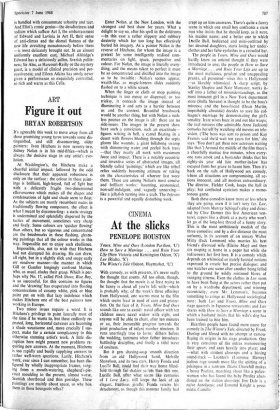CINEMA
At the slicks
PENELOPE IIOUSTON
Yours, Mine and Ours (London Pavilion, 'Ll') How to Save a Marriage . . . and Ruin Your Life (New Victoria and Kensington Odeon, 'X') Luv (Rialto, 'X') The Winter's Tale (Odeon, Haymarket, `U') With comedy, as with presents, it's never really the thought that counts. All too often, though, the thought that the movie is at least trying to be funny is about all you're left with—which is probably why, of the week's three offerings from Hollywood, one warms most to the film which seems least in need of care and protec- tion. On the face of it, Yours, Mine ?Ind Ours sounds like one to avoid: naval officer with ten children meets naval widow with eight, and anyone will be able to chart, after ten minutes or so, their inexorable progress towards the joint production of infant number nineteen. It runs unerringly true to form: dithers before the wedding, tantrums when father introduces battleship discipline, and finally a tidal wave of eoGinecg But it gets shaving-soap smooth direction from an old Hollywood hand, Melville Shavelson, and its two stars, Henry Fonda and Lucille Ball, could find their way home blind- fold through far shakier scripts than this one. Lucille Ball, after what seems like centuries of I Love Lucy, still keeps the look of an elegant, fractious giraffe; Fonda retains his detachment, as though this monster family had crept up on him unawares. There's quite a funny scene in which one small boy confronts a stern nun who insists that he should keep, as it were, his maiden name; and a better one in which Ltcille Ball, bedizened and mini-outfitted by her devoted daughters, starts losing her under- clothes and her false eyelashes in a crowded bar.
The people in Yours. Minr and Ours would hardly know an unkind thought if they were introduced to one; the people in How to Save a Marriage . . . and Ruin Your Life are up to the most malicious, petulant and unappealing pranks, all presented—since this is Hollywood —as likeably whimsical. A sharp script, by Stanley Shapiro and Nate Monaster, works it- self into a lather of misunderstandings, as the most innocent girl in a New York department store (Stella Stevens) is thought to be the boss's mistress; and the boss-friend (Dean Martin, improbably altruistic) decides to save his col- league's marriage by demonstrating the girl's venality. Irate wives buzz in and out like wasps; the real mistress (the admirable Anne Jackson) consoles herself by watching old movies on tele- vision. ('The hero was sent to prison and Kay Francis said she'd wait ten years for him,' she says. 'You don't get these new actresses waiting like that.') Around the middle of the film there's a cheerfully maniac five minutes, when every- one runs amok and a bystander thinks that his eighty-six year old late mother-in-law has escaped from her grave to haunt him. Then it's back on the rails of Hollywood sex comedy, where all situations are compromising, all ac- tions innocent, and all motives extraordinary. The director, Fielder Cook, keeps the ball in play; but confected cynicism makes a mono- tonous game.
Both these comedies know more or less where they are going, even if it isn't very far. Luv, adapted from Murray Schisgal's play and direc- ted by Clive Donner (his first American ven- ture), capers like a drunk at a party who won't let go of the long-lost thread of a funny story. This is the most ambitiously modish of the three comedies; and by a dire distance the most unfunny, in its account of an uneasy Walter Mitty (Jack Lemmon) who marries his best friend's divorced wife (Elaine May) and then sits moping at home in a paper hat while she rediscovers her first love. It is a comedy which depends on whimsical or irately farcical notions expressed in erratic but precise dialogue; and one watches one scene after another being felled to the ground by wildly mistimed blows of swinging cinema. Even the clothes in Luv seem to have been flung at the actors rather than put on by a wardrobe department; and winning eccentricity; even Mr Lemmon's, becomes something to cringe at. Hollywood sociological note: both Luv and Yours, Mine and Ours stage quarrels in Japanese restaurants; and Luv shares with If ow to Save a Marriage a scene in which a husband insists that his wife's dog has been trained to bite him.
Heartless people have found more cause for comedy in The Winter's Tale, directed by Frank Dunlop and filmed with no attempt at camou- flaging its origins in his stage production. One is very conscious of the extras manoeuvring their spears and axes heavily into place; and —what with strident close-ups and a hissing sound-track — Leontes's (Laurence Harvey) jealous rage sounds more like the spitting of a pekingese in a tantrum. Diana Churchill makes a bossy Paulina, marching about like a police- woman who has found the baby Perdita aban- doned on the station doorstep; Jim Dale is a naive Autolycus; and Esmond Knight a pessi- mistic Camillo.






































 Previous page
Previous page